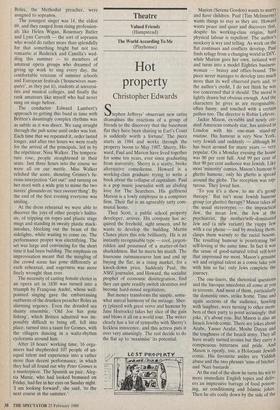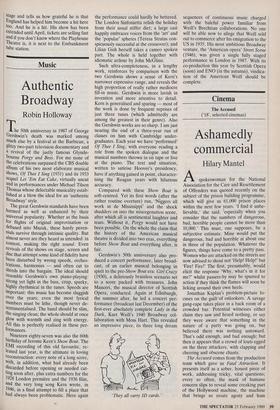Theatre
Valued Friends (Hampstead)
The World According To Me (Playhouse)
Hot property
Christopher Edwards
Stephen Jeffreys' observant new satire dramatises the reactions of a group of friends to the discovery that the basement flat they have been sharing in Earl's Court is suddenly worth a fortune' The piece starts in 1984 and works through the property boom to May 1987. Sherry, Ho- ward, Paul and Marion have lived together for some ten years, ever since graduating from university. Sherry is a scatty, broke alternative comedienne. Howard is a working-class graduate trying to write a book about the collapse of capitalism. Paul is a pop music journalist with an abiding love for The Searchers. His girlfriend Marion is a lowly employee in a computer firm. Their flat is an agreeably tatty com- munal home.
Then Scott, a public school property developer, arrives. His company has ac- quired the freehold, sight unseen, and he wants to develop the building. Martin Clunes plays this role brilliantly. He is an instantly recognisable type — cool, j argon- ridden and possessed of a matter-of-fact sharkishness. But he meets his match. The foursome outmanoeuvre him and end up buying the flat, in a rising market, for a knock-down price. Suddenly Paul, the NME journalist, and Howard, the socialist prophet of economic disintegration, find they can quite readily switch identities and become hard-nosed negotiators. .
But money transforms the simple, some- what unreal harmony-of the ménage. Sher- ry (played with great verve and humour by Jane Horrocks) takes her slice of the gain and blows it all on a world tour. The writer clearly has a lot of sympathy with Sherry's feckless innocence, and this actress puts it over very amusingly. The rest decide to do the flat up to 'maximise' its potential.
Marion (Serena Gordon) wants to marry and have children. Paul (Tim Mclnnerny) wants things to stay as they are. Howard wants peace and quiet and discovers that, despite his working-class origins, hard physical labour is repellent. The author's mockery is wry and telling. As work on the flat continues and conflicts develop, Paul finds refuge from a changing world in DIY, while Marion goes her own, isolated way and turns into a model Eighties business- woman — brassy and office-bound. The piece never manages to develop into much more than its well observed parts and, to the author's credit, I do not think he was too concerned that it should. The moral is lightly drawn but obvious enough. And the characters he gives us are recognisable, often funny, and touched with a certain pathos too. The director is Robin Lefevre.
Jackie Mason, ex-rabbi and newly cre- ated American comedy star, has arrived in London with his one-man stand-UP routine. His humour is very New York, very Jewish and suddenly — although he has been around for many years — very popular. On a Monday evening the house was 90 per cent full. And 99 per cent of that 90 per cent audience was Jewish. Like most 'minority' comics, Mason's humour is ghetto humour, only his ghetto is spread around the globe. The reception was rap- turous. They loved him.
`To you it's a show, to me it's group therapy.' But isn't most Jewish humour group (or ghetto) therapy? Mason takes all the usual stereotypes — the impractical Jew, the mean Jew, the Jew at the psychiatrist, the mother/wife-dominated Jew and (a new variant) the yuppy Jew with a car phone — and by mocking them, clasps them warmly to the racial bosom. The resulting humour is penetrating but self-loving at the same time. In fact it was the sense of good-natured tribal self-love that impressed me most. Mason's genuine wit and original talent as a comic take you with him so far; only Jews complete the journey.
The one-liners, the rhetorical questions and the baroque anecdotes all come at you in torrents. And most of them, particularly the domestic ones, strike home. Time and again sections of the audience, howling with laughter, were turning to other mem- bers of their party to point accusingly: that joke, it's about you. But Mason is also an Israeli Jewish comic. There are jokes about Arabs, Yasser Arafat, Moshe Dayan and the toughness of the Israeli army. They all have neatly turned ironies but they carry a conspicuous bitterness and pride. And Mason is openly, too, a Holocaust Jewish comic. His favourite asides are Yiddish abuse and the two phrases 'sons of bitches' and 'Nazi bastards'.
At the end of the show he turns his wit to more immediate English topics and deliv- ers an impressive barrage of food poison- ing, air conditioning and Islamic jokes. Then he sits cosily down by the side of the stage and tells us how grateful he is that England has helped him become a hit here too. And he is a hit. His show has been extended until April, tickets are selling fast and if you don't know where the Playhouse Theatre is, it is next to the Embankment tube station.

















































 Previous page
Previous page